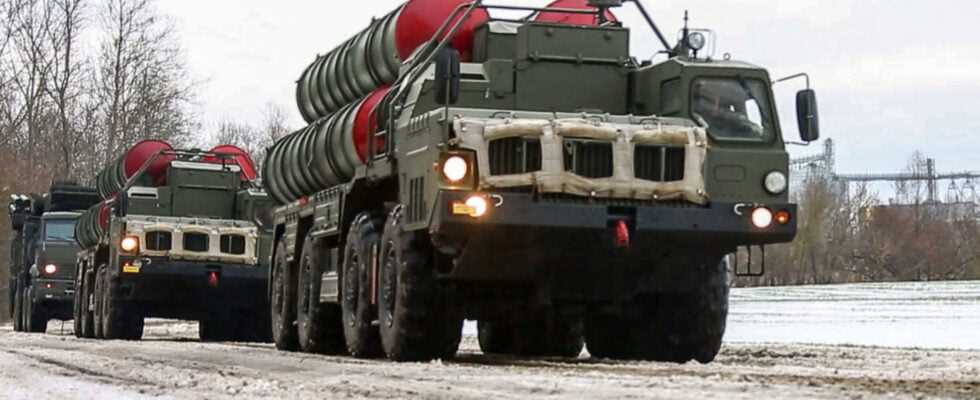The Russian and Belarusian armies began maneuvers in Belarus for ten days on Thursday, in the midst of Russian-Western tensions around Ukraine and while diplomatic efforts continue to defuse the crisis. The deployment of these soldiers was immediately denounced by the Ukrainian presidency as a means of “psychological pressure” used by Moscow, which has since November massed more than 100,000 soldiers on the eastern borders of Ukraine.
“A gesture of great violence”, reacts Le Drian
“Everything leads us to believe that it is a gesture of great violence”, reacted for his part the French Minister of Foreign Affairs Jean-Yves Le Drian, describing the maneuvers as “extremely massive”. On the eve of the exercises, the Russian military released a video showing a battery of S-400 anti-aircraft systems moving into position and pointing their missiles skyward from a snowy terrain in the Belarusian region of Brest, bordering the ‘Ukraine. Russia is accused of being ready to carry out a new military operation against Kiev, after the annexation of Crimea in 2014, accusations rejected by the Kremlin which says it wants to ensure its security in the face of hostility from Kiev and the NATO.
On the diplomatic front, German Chancellor Olaf Scholz receives the leaders of the Baltic countries, former Soviet republics members of NATO, in Berlin on Thursday. British Prime Minister Boris Johnson, who announced the dispatch of 350 more soldiers to Poland, is going to Brussels where he will meet NATO officials before going to Warsaw. Its foreign minister, Liz Truss, is in Moscow.
London calls on Moscow to withdraw troops near Ukrainian borders
The head of British diplomacy Liz Truss on Thursday called on Russia to withdraw its troops massed near the Ukrainian borders, in order to begin a de-escalation between Moscow and Westerners who fear a Russian military operation against Kiev. “Minister Lavrov told me today that Russia has no plans to invade Ukraine, but these words must be followed by action and we need to see the troops and equipment stationed on the Ukrainian border be moved elsewhere,” Liz Truss said after a meeting in Moscow with her Russian counterpart Sergey Lavrov.
Preparing to repel an external attack, says Russia
The Russian-Belarusian exercises “are taking place with the objective of preparing to stop and repel external aggression as part of a defensive operation”, assured the Russian Ministry of Defense. According to this source, the maneuvers are taking place until February 20 on five military fields, four air bases and “different sites” in Belarus, in particular in the Brest region.
The armies of Minsk and Moscow did not specify the number of soldiers and equipment participating in these exercises, but the Westerners affirm that 30,000 Russian soldiers have been deployed in Belarus in this context. Moscow also announced on Thursday the arrival in Crimea of six warships for upcoming maneuvers in the Black Sea, at the heart of tensions between Moscow and Kiev.
Macron got assurances that Russian troops will leave Belarus
Tensions have sparked a diplomatic ballet this winter between Moscow and Western capitals to try to defuse the crisis. French President Emmanuel Macron notably traveled to Moscow on Monday, then to Kiev on Tuesday. He claimed to have received from Russian President Vladimir Putin pledges that there would be no further “escalation” and assurances that Russian troops deployed in Belarus will leave as planned once the maneuvers are over. The Ukrainian army launched its own maneuvers this week throughout its territory, providing for the use of Turkish combat drones and anti-tank missiles delivered by London and Washington.
In the event of a Russian attack, the West has threatened Moscow with major economic sanctions which will be added to those taken in 2014 after the annexation of the Ukrainian peninsula of Crimea. This annexation was followed by the start of a conflict in eastern Ukraine between Kiev and Russian-backed separatists, a war that has claimed more than 14,000 lives in eight years, according to the UN, and is continues despite peace agreements in 2015.
It’s the turn of the British to discuss with Russia
“Ideologized approaches, ultimatums and threats lead nowhere,” retorted the head of Russian diplomacy Sergei Lavrov on Thursday, at the start of his meeting with Briton Liz Truss, who urged the Kremlin to follow a “diplomatic path to avoid “bloodshed”. Russia denies seeking to destabilize its pro-Western neighbor and swears it wants to defend itself against NATO, which Ukraine wants to join.
Moscow demands an end to the Alliance’s enlargement policy, a commitment not to deploy offensive weapons near Russian borders and the withdrawal of NATO military infrastructure from the 1997 borders, before the organization does not host former members of the Soviet bloc. The United States, which sent military reinforcements to Eastern Europe, rejected these demands but left the door open to discussions on other subjects, such as the deployment of missiles or reciprocal limits on military exercises.
